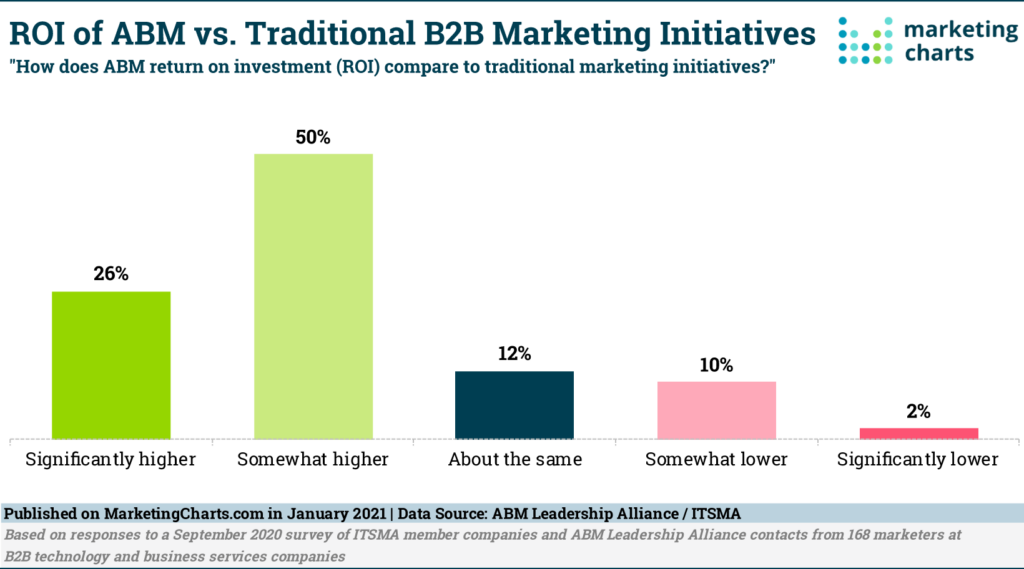Six Account-Based Marketing Myths Debunked (6 ABM Myths)

Everything seems to be Account-Based Marketing (ABM) these days. B2B companies of all ranges and sectors claim to be doing it. Marketing agencies put it at the top of their services menu, whilst certifications and accreditations flourish.
But as everything that gets hype, the danger is that ABM might lose its true meaning. And as a result, it can be somehow tricky to find the right way for companies that want to embrace this journey.
In many of our conversations with customers and peers, we sense a certain level of confusion and doubts that unfortunately, reflects the way ABM has been presented (and sold by some) in the last few years.
Today, we will debunk six common ABM myths.
By understanding the truth about Account-Based Marketing, you can decide if it is the right strategy for your business.
Ready? Let’s go!
Six ABM Myths Uncovered:
- Account-Based Marketing is too strategic, time-consuming, and requires a big budget!
- It’s just a simple martech platform
- ABM is just bombarding prospects with unwanted content
- Account-Based Marketing is a one-off, last-minute campaign
- For ABM to be a success, there should be less than 10 accounts
- Account-Based Marketing is very complicated
Myth 1: Account-Based Marketing is too strategic, time-consuming, and requires a big budget!
One of the most common ABM myths we come across is that ABM is often thought of as being too strategic, time-consuming, and always requires a big budget. Hence, it should be discussed in the boardroom only.
Well, that’s not exactly true.
First and foremost, ABM is an effective way to organise and execute your marketing activities.
It’s certainly strategic in nature as it’s a company-wide exercise that requires sales and marketing to be hand in glove, with the blessing and the involvement of high-level execs.
Nonetheless, it’s operational in nature. It’s based on a solid tech stack, and it roots deeply into executing sales and marketing actions that deliver relevant messages and offer a personalized experience to a selected audience.
Accessible from a budget standpoint and cost-effective, it’s definitely suitable for small companies that do not have a full marketing house or a seven-figure budget.
Myth 2: It’s just a simple martech platform
Don’t think of ABM as a simple martech platform that crunches information and magically delivers super-sales qualified leads that the marketing team can proudly share with the business execs.
We have seen many companies taking the shortcut of considering ABM only as a tech product or the latest fashionable platform.
ABM isn’t just the sum of tactics that aim to generate volumes (impressions, clicks, cold leads, large number of individuals with little likelihood to convert, etc.) but it’s a long-lasting programme that can build a healthy business pipeline.
Think of ABM more as a programme that starts with the understanding of companies’ and individuals’ challenges, personalises the buyer experience, and serves relevant content over time to show that you are a legitimate partner who has the right solutions for those challenges.
That’s why it’s a real company effort: sales, marketing, intelligence team, IT infrastructure, CRM platform, skills & enablement squad: everyone is aligned and knows what the objectives are, both short and long-term.
Myth 3: ABM is just bombarding prospects with unwanted content
ABM is about bombarding prospects with content about your products and services – that often have little to do with their needs.
Not quite. Just another one of those ABM myths.
Here’s the truth…
Those shiny marketing funnels that a whole generation of marketers have shared as a mantra, with arrows everywhere and with ‘golden eggs’ at the end, aren’t working any longer. The reason why they aren’t working is simple – we’ll cover this in one of our next blogs.
Simply put, customers’ behaviour isn’t a rigid and 100% predictable sequence of actions. More importantly, it doesn’t start with a cold call or with a form to fill.
Believe it or not, we’ve even had a client want to ask their prospects to fill a form with 12 mandatory fields to get an infographic. It looked longer than those income tax return modules! And yes, we educated them on how better to go about that…
Instead, you need to build relevance for your brand and products first.
You have to tell your story by serving relevant content to both companies and individuals. This should be about their needs and often through multiple channels (digital and human), in an orchestrated fashion. And then push actions that convert only when another ‘multi-channel’ combination of factors (intent signals, human conversations, time, etc.) shows that the prospect is ready to move forward.
Remember, those companies or prospects that move to the conversion step can be as few as 5% of the universe you reached out to.
Myth 4: Account-Based Marketing is a one-off, last-minute campaign
ABM is not a one-off, one-quarter, last-minute activity when extra-budget is available.
It’s more of a company-wide programme and an effective way to organise your awareness and demand generation activities. ABM needs to be planned in advance and works best over time.
You need time to:
- Define your objective jointly with sales and business executives
- Build your list based on different intelligence sources
- Develop your story and how you can be relevant to customers’ pain points
- Target your audience, serve content that matter and personalise the experience
- Co-ordinate your online and offline activities to push the brand experience forward
Make no mistake, we’re not saying that an ABM programme takes ages to plan and deliver.
It usually brings short-term results – actually, we have case studies with customers where the ROI is almost immediate.
But it requires patience and endurance in the medium-term.
You need to improve your customers’ knowledge (pain points, needs, multiple decision-makers in a single account, etc.), to build relevance and trust for your brand, to be a legitimate partner.

ROI of ABM vs Traditional B2B Marketing Initiatives. Source: marketingcharts.com
Myth 5: For ABM to be a success, there should be less than 10 accounts
This is a tricky topic. We discuss this very often with our B2B customers. Let’s say upfront that there isn’t an ultimate truth or a one-size fits all solution.
You can certainly focus on a handful of very strategic accounts with the objective to gather new insights, build a more precise map of customers’ decision makers and pave the way for your sales team to engage further. There are risks of narrowing your target though. Your story is less visible to a wider audience that could be relevant to your business. The cost per ‘acquisition’ (however you define acquisition), is higher and harder to debate in a boardroom.
When we work with our customers, we often advise to take a pragmatic but no less strategic approach. Having a short list of accounts to focus on is mandatory. Hopefully, the list isn’t a random sequence of accounts put together by over-solicited sales folks…
This allows you to be relevant to accounts and individuals that matters for your company and build a story that is right on spot to their needs.
In parallel, it makes sense to also take a programmatic approach. You can build larger look-alike lists with accounts with whom you start building awareness for your brand. Test the reaction, analyse intent data, expand clients’ decision-making map, serve more focused content, test again etc.
This will create a virtuous circle that allows you to reach targets that were not originally on your radar screen.
Myth 6: Account-Based Marketing is very complicated
“ABM is complicated and I don’t have the skills to execute.”
As we said earlier, ABM is an effective way to organise and execute your B2B marketing activities. It should be pervasive to your marketing organisation or have a specific team that focuses on ABM as a true practice.
A valid alternative is to rely on Account-Based Marketing agencies that have relevant skills and expertise in ABM. It doesn’t mean to outsource intellectual capital, but only to rely on market experts and free up your in-house team to focus on other areas.
Agencies need to have a proven track record of ABM programme implementations. From strategic advice to the right tech platform, so that they can provide a seamless execution. And more importantly, they have to be a right fit for your business.
We hope that you’ve understand these common myths and how to overcome them. You are now ready to pursue an ABM strategy in your business. Keep in mind, there is a saying that ‘once an ABMer, always an ABMer’.
If you need some help navigating the ABM ocean with a solid ship and a crew that is experienced and knows well how to select the best route, get in touch today or drop me a line (Adriano). We’ll be delighted to show how we’ve helped dozens of our customers build and implement long-lasting ABM programmes that deliver tangible business results.
Get in touch with Creation Agency